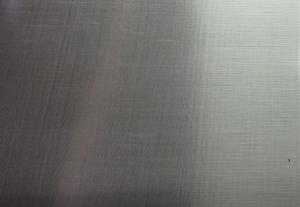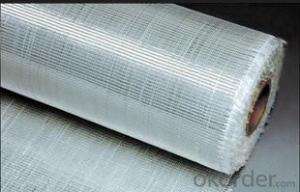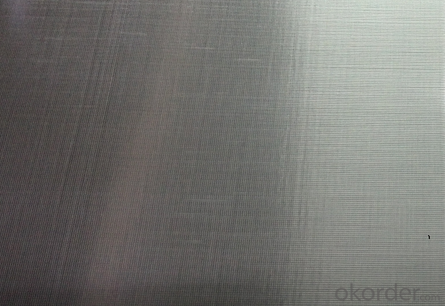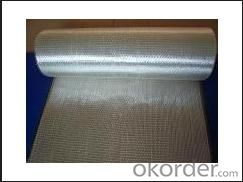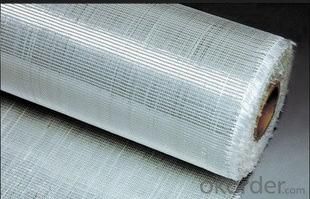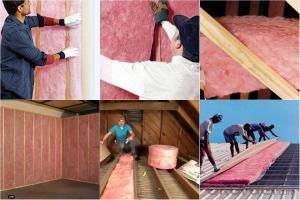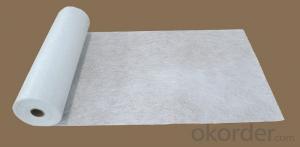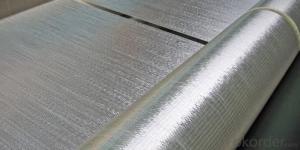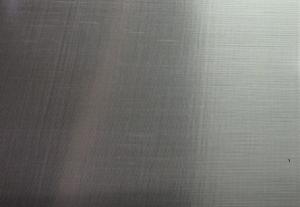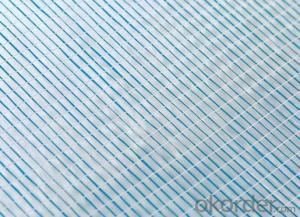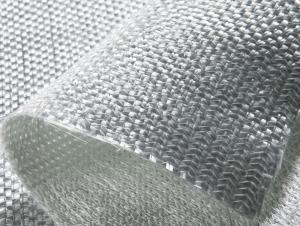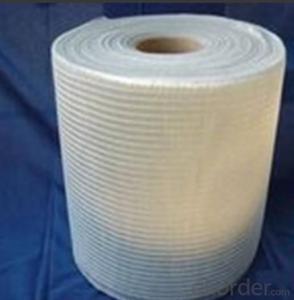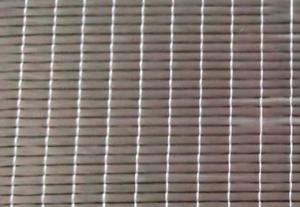Fiberglass Mat Tissue Unidirectional Fabric 800gsm 1000mm
- Loading Port:
- Shanghai
- Payment Terms:
- TT or LC
- Min Order Qty:
- 2000 m²
- Supply Capability:
- 30000 m²/month
OKorder Service Pledge
OKorder Financial Service
You Might Also Like
Structure of unidirectional fiberglass fabric Description:
An engineering material, which has many excellent characterstics, such as anti-burning, corrosion resistent, stable structure, heat-isolating, minimum elongated shrinkage, high intensity, etc. This new material product has already covered many domains such as electric appliance, electronic, transportation, chemical engineering, architectural engineering, heat insulation, sound absorption, fire prevention and environmental protection, etc. According to fabric organizational structure and appearance, there are such kind of products: plain weave, twill weave, satin weave, gauze weave.
Main Features of the unidirectional fiberglass fabric:
1)Plain veave,even thickness and low fuzz;
2)High strength in both warp and weft direction;
3)Incombustibility,corrosion resistance and heat resistance;
4)E-Grade Fabric (E-fiberglass Textile Cloth) has excellent electricity insulation property.
Unidirectional fiberglass fabric Images:
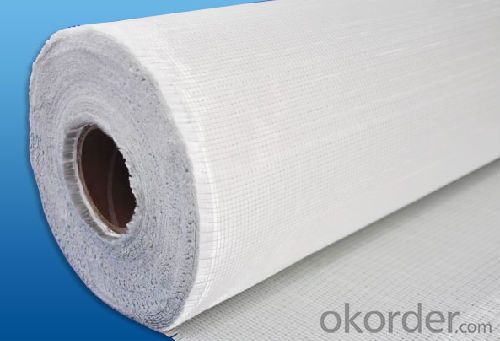
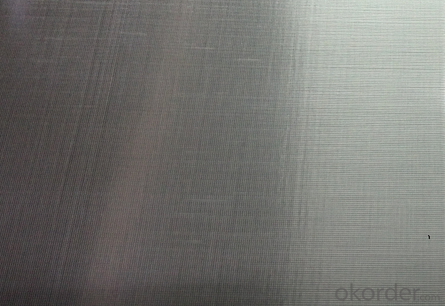
Unidirectional Specification:
Code | Total weight g/m2 | Weight of each layer, g/m2 | Width mm | ||||
0° | 90° | +45° | -45° | Chopping | |||
E-L300 | 350 | 300 | 50 | 200~2600 | |||
E-L350 | 400 | 350 | 50 | 200~2600 | |||
E-L400 | 450 | 400 | 50 | 200~2600 | |||
E-L450 | 500 | 450 | 50 | 200~2600 | |||
E-L500 | 550 | 500 | 50 | 200~2600 | |||
E-L600 | 650 | 600 | 50 | 200~2600 | |||
E-L650 | 700 | 650 | 50 | 200~2600 | |||
E-L900 | 930 | 880 | 50 | 200~2600 | |||
E-L700/200 | 950 | 700 | 50 | 200 | 200~2600 | ||
E-T200 | 200 | 200 | 200~2600 | ||||
E-T450 | 450 | 450 | 200~2600 | ||||
E-T500 | 500 | 500 | 200~2600 | ||||
E-TM300/300 | 600 | 300 | 300 | 200~2600 | |||
E-TM600/450 | 1050 | 600 | 450 | 200~2600 | |||
E-LM750/200 | 950 | 750 | 200 | 200~2600 | |||
FAQ of woven roving:
Delivery Detail: 15-21days
Other spec. can be custom made as per customer's request.
- Q: Can fiberglass mat tissue be used for windbreak panels?
- Windbreak panels can utilize fiberglass mat tissue, which functions as a lightweight and flexible material. This material is commonly utilized in insulation, reinforcement, and structural support applications. It is recognized for its durability, high strength-to-weight ratio, and ability to withstand various weather and environmental conditions. By incorporating fiberglass mat tissue into windbreak panels, additional reinforcement and stability are provided. This reinforcement allows the panels to endure strong winds without experiencing damage or breakage, rendering fiberglass mat tissue an effective choice for windbreak panels. Furthermore, fiberglass mat tissue possesses exceptional thermal and acoustic insulation properties. This feature contributes to the reduction of noise and regulation of temperature within windbreak panels, thus creating a more comfortable and protected environment. Additionally, this material is fire-resistant, ensuring the safety of windbreak panels. In summary, considering its strength, durability, insulation properties, and resistance to environmental conditions, fiberglass mat tissue proves to be a suitable and dependable material for windbreak panels.
- Q: What are the different fabric finishes available for fiberglass mat tissue?
- There are several different fabric finishes available for fiberglass mat tissue, each offering unique properties and characteristics. Some of the most common fabric finishes include: 1. Polyester: Polyester fabric finishes are widely used in fiberglass mat tissue as they provide excellent strength and durability. This finish helps to improve the overall tear resistance and tensile strength of the fiberglass mat tissue. 2. Polypropylene: Polypropylene fabric finishes are known for their high resistance to chemicals and moisture. This finish helps to enhance the water resistance properties of the fiberglass mat tissue, making it suitable for applications where moisture or chemical exposure is a concern. 3. Acrylic: Acrylic fabric finishes provide good heat resistance and flame retardancy to the fiberglass mat tissue. This finish helps to improve the thermal stability and fire resistance of the material, making it suitable for applications where high temperatures or fire hazards are present. 4. Nylon: Nylon fabric finishes are known for their excellent abrasion resistance and toughness. This finish helps to enhance the durability and wear resistance of the fiberglass mat tissue, making it ideal for applications where frequent contact or friction may occur. 5. Polyethylene: Polyethylene fabric finishes offer excellent resistance to moisture and chemicals. This finish helps to improve the overall water repellency and chemical resistance of the fiberglass mat tissue, making it suitable for outdoor or corrosive environments. 6. Polyurethane: Polyurethane fabric finishes provide good flexibility and elasticity to the fiberglass mat tissue. This finish helps to enhance the material's ability to withstand bending and stretching without breaking or tearing. Overall, the choice of fabric finish for fiberglass mat tissue depends on the specific application requirements. It is important to consider factors such as strength, durability, water resistance, flame retardancy, abrasion resistance, and chemical resistance when selecting the appropriate fabric finish for a particular application.
- Q: What are the different surface finishes available for fiberglass mat tissue?
- Fiberglass mat tissue offers a variety of surface finishes, each with its own unique properties and advantages. One option is a smooth or fine finish, which gives the fiberglass mat tissue a smooth and even texture. This finish is commonly used in applications that require a high-quality surface appearance, such as cosmetic uses or when the mat will be painted or coated. Another choice is a textured or coarse finish, which adds texture and grip to the surface of the fiberglass mat tissue. This finish is often utilized in situations where increased friction or traction is necessary, like in flooring or decking materials. A third possibility is a fire-retardant finish, which provides extra fire resistance to the fiberglass mat tissue. This finish is frequently employed in applications where fire safety is a concern, such as building materials or insulation. Furthermore, there are finishes available that offer specific properties, such as enhanced chemical resistance, UV resistance, or improved durability. These finishes are commonly used in situations where the fiberglass mat tissue will be exposed to harsh environmental conditions or chemicals. Ultimately, the selection of a surface finish for fiberglass mat tissue depends on the specific application and desired properties. By choosing the appropriate finish, manufacturers can ensure that the fiberglass mat tissue meets the required performance standards and delivers the desired performance characteristics.
- Q: Is fiberglass mat tissue suitable for chemical storage tanks?
- Chemical storage tanks often find fiberglass mat tissue to be a suitable choice. The chemical resistance properties of fiberglass itself are well-known, which is why it is commonly used for storing a wide variety of chemicals. Moreover, fiberglass mat tissue is typically employed as a reinforcement layer during the construction of fiberglass tanks, providing them with added strength and durability. Nevertheless, it is important to consider the specific chemical being stored. Certain highly corrosive or reactive chemicals may necessitate the use of more specialized materials or additional protective coatings to ensure the tank's integrity. Therefore, it is always advisable to seek guidance from a professional engineer or manufacturer in order to identify the most appropriate materials for a given chemical storage application.
- Q: Is fiberglass mat tissue suitable for automotive panel repairs?
- Yes, fiberglass mat tissue is suitable for automotive panel repairs.
- Q: How is fiberglass mat tissue used in the aerospace industry?
- Fiberglass mat tissue is extensively used in the aerospace industry due to its exceptional properties and versatility. It serves various purposes and plays a crucial role in the manufacturing and maintenance of aircraft. One of the primary applications of fiberglass mat tissue in the aerospace industry is its use in composite materials. Composite materials, which are made by combining two or more materials, are widely used in aircraft construction to reduce weight while maintaining structural integrity. Fiberglass mat tissue is often used as a reinforcement material in composite laminates. It provides strength, stiffness, and dimensional stability to the structure, making it suitable for various components such as wings, fuselage, and tail sections. The high tensile strength of fiberglass mat tissue ensures the composite structure can withstand the demanding conditions faced in the aerospace industry. Furthermore, fiberglass mat tissue is also utilized in the repair and maintenance of aircraft. It is commonly used in the process of composite patching, which involves repairing damaged or worn-out composite components. The fiberglass mat tissue is impregnated with resin and applied to the damaged area, providing strength and restoring structural integrity. This technique is widely employed for repairing aircraft components such as fairings, radomes, and other composite parts, ensuring their safe and reliable operation. Moreover, fiberglass mat tissue finds application in the insulation of aircraft. It is used as a thermal and acoustic insulation material in the interior cabin and other critical areas of the aircraft. Fiberglass mat tissue helps in reducing heat transfer, preventing condensation, and maintaining a comfortable cabin environment for passengers and crew. Additionally, its sound-absorbing properties help minimize noise levels inside the aircraft, enhancing the overall travel experience. In conclusion, fiberglass mat tissue is an indispensable material in the aerospace industry. It is used in the production of composite structures, repair and maintenance of aircraft, and as an insulation material. Its exceptional properties, including high tensile strength, dimensional stability, and thermal/acoustic insulation capabilities, make it an ideal choice for various applications in the aerospace industry.
- Q: Does fiberglass mat tissue provide any thermal insulation?
- Indeed, thermal insulation is provided by fiberglass mat tissue. The reason lies in the fact that fiberglass possesses a low heat conductivity, impeding the effortless transfer of heat. As a mat tissue, it successfully captures air within its fibers, thereby generating an insulation layer. This layer serves as a shield against heat transfer via conduction and diminishes the loss of thermal energy. Consequently, fiberglass mat tissue proves to be a viable remedy for achieving thermal insulation in numerous sectors, including construction, automotive, and aerospace industries.
- Q: How does fiberglass mat tissue compare to mineral wool insulation?
- Fiberglass mat tissue and mineral wool insulation are two common types of insulation materials used in construction and other industries. While both materials serve the purpose of providing thermal insulation, there are some differences between the two. Fiberglass mat tissue is made from fine glass fibers that are bonded together to form a mat. It is lightweight and flexible, making it easy to handle and install. Fiberglass mat tissue is also resistant to moisture, mold, and pests, making it a durable option for insulation. It has a high R-value, which measures the material's ability to resist heat flow, making it an effective insulator. On the other hand, mineral wool insulation is made from natural minerals such as basalt, diabase, or slag. It is typically denser and heavier than fiberglass mat tissue. Mineral wool insulation is known for its excellent fire resistance properties, as it is non-combustible and can withstand high temperatures. It also provides sound insulation, reducing noise transmission. However, mineral wool insulation can absorb moisture, which can reduce its effectiveness over time. In terms of thermal performance, both materials offer similar levels of insulation. However, fiberglass mat tissue tends to be slightly more efficient due to its higher R-value. Additionally, fiberglass mat tissue is generally more affordable compared to mineral wool insulation. In conclusion, fiberglass mat tissue and mineral wool insulation are both effective insulation materials. The choice between the two will depend on specific project requirements, such as fire resistance, sound insulation, cost, and moisture resistance. It is important to consider these factors and consult with professionals to determine the most suitable insulation material for a particular application.
- Q: How is fiberglass mat tissue different from fiberglass cloth?
- Fiberglass mat tissue and fiberglass cloth are both materials made of woven glass fibers, but they have some key differences. Fiberglass mat tissue is a non-woven material that consists of randomly oriented glass fibers held together by a binder material. It is typically used as a reinforcement layer in composite materials such as fiberglass reinforced plastic (FRP) or fiberglass reinforced concrete (FRC). The random orientation of the fibers provides strength and stability to the composite structure. Fiberglass mat tissue is commonly used in applications where strength and rigidity are important, such as boat hulls or automotive parts. On the other hand, fiberglass cloth is a woven material that is made by interlacing glass fibers together in a specific pattern. It is commonly used for applications where flexibility and conformability are important, such as in the construction of surfboards or in the aerospace industry. Fiberglass cloth allows for more precise and controlled placement of fibers, making it suitable for creating complex shapes and achieving a higher level of detail in the final product. Overall, the main difference between fiberglass mat tissue and fiberglass cloth lies in their structural characteristics and intended applications. Fiberglass mat tissue offers strength and stability, while fiberglass cloth provides flexibility and conformability. The choice between these materials depends on the specific requirements of the project and the desired outcome.
- Q: What are the potential health and safety concerns associated with working with fiberglass mat tissue?
- Working with fiberglass mat tissue can pose several potential health and safety concerns. Firstly, fiberglass contains tiny glass fibers that can become airborne when the material is cut, sanded, or disturbed. Inhalation of these fibers can lead to respiratory problems such as coughing, wheezing, and difficulty breathing. Prolonged exposure to fiberglass dust may also cause lung diseases like fibrosis or even lung cancer. Additionally, direct contact with fiberglass mat tissue can irritate the skin, leading to itching, redness, and rashes. The sharp edges of the glass fibers can cause tiny cuts or punctures, which may become infected if not properly treated. Moreover, fiberglass is a lightweight material that can easily become airborne and settle on surfaces, increasing the risk of ingestion or contamination of food and drinks. Ingesting fiberglass particles can irritate the digestive system, causing nausea, vomiting, and abdominal pain. To ensure the health and safety of workers, proper precautions should be taken when working with fiberglass mat tissue. This includes wearing personal protective equipment such as gloves, safety glasses, and respiratory masks to minimize exposure to airborne fibers. Adequate ventilation and dust control measures should also be in place to prevent the accumulation of fiberglass dust in the work area. Regular cleaning and maintenance should be performed to keep the work environment free from fiberglass particles. Workers should be educated on the proper handling and disposal of fiberglass materials to minimize the risk of contamination. Overall, while fiberglass mat tissue is a widely used material, it is important to be aware of the potential health and safety concerns associated with its handling and take necessary precautions to minimize the risk of exposure.
Send your message to us
Fiberglass Mat Tissue Unidirectional Fabric 800gsm 1000mm
- Loading Port:
- Shanghai
- Payment Terms:
- TT or LC
- Min Order Qty:
- 2000 m²
- Supply Capability:
- 30000 m²/month
OKorder Service Pledge
OKorder Financial Service
Similar products
Hot products
Hot Searches
Related keywords
